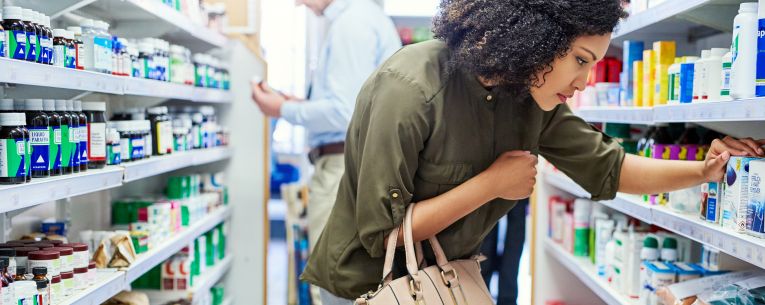After a full day of traveling, you check into your resort and get ready to head out for dinner. You just have to grab your blood-thinner medication, so you can take it with your meal. But it’s not in your suitcase. As you frantically search, a memory jolts you: You left the orange bottle on the kitchen counter at home.
This is not good. You’re supposed to take your medicine every day to decrease your risk of blood clots or stroke. What should you do now?
First: Don’t panic. It’s possible to get the prescription medication you need while on vacation—and travel insurance can help. We’ll walk you through it.
How to refill a prescription while traveling in the U.S.
In the U.S., getting a prescription refilled while traveling is usually pretty straightforward. Call your prescribing physician’s office or your home pharmacy and explain the situation. Ask if they can arrange for a pharmacy near you to dispense the medication you need. If your home pharmacy is part of a chain, it’ll be easiest to go to a local branch of that chain (because your information will already be in the system.)
- Can’t reach your healthcare provider because it’s a weekend or a holiday? If you need the medication right away, go to a local urgent-care clinic or emergency room.
- What if your insurance company won’t pay for the extra medication? Ask for a one-time vacation override. You may still have to pay a copay, but insurance should cover the costs.1
If you run into any difficulties getting your medication, contact 24-7 assistance, which is included in every Allianz Travel Insurance plan. Our assistance experts are there to help you.
How to refill a prescription while traveling overseas
Traveling with prescription drugs internationally can be a challenge in itself—and refilling a prescription outside the United States is even tougher. Typically, pharmacies overseas will only accept a prescription written in that country. So, here’s what you should do:
- Contact your healthcare provider back home. Ask them to email you a copy of your prescription, if you don’t already have it, along with a letter from your doctor that explains why you need the medication. Make sure the prescription includes the generic name of the drug, not just the brand name (which may not be recognized overseas.)
- Make an appointment with a local healthcare provider. Explain that you forgot your medication while traveling and you need a valid prescription. Bring your prescription and doctor’s letter to show them (with translations, if needed). Be aware that some medications may not be available in your destination country.
Need help finding a healthcare provider? Use the Allyz® TravelSmart app to get a list of high-quality medical facilities near you. Or, 24-hour assistance can recommend English-speaking healthcare providers, and even arrange a conference call with your doctor back home. - Take the prescription to a local pharmacy. Expect to pay out of pocket for your medications, because U.S. health insurance cards aren’t typically accepted overseas. Prescriptions aren’t covered by your travel insurance, except as part of care received for a covered medical emergency or if a qualifying trip interruption caused you to run out of your medicine and not having it would cause serious harm.
Having trouble communicating with the pharmacist? Our 24-hour assistance team can provide interpretation services.
How to refill a prescription on a cruise ship
Forgot your medication while on a cruise? The first step is to see the ship’s doctor. If your prescription is a common one—blood pressure or diabetes medication, for example—chances are the onboard pharmacy can fill it. The charge will be added to your bill. If the cruise-ship pharmacy doesn’t have the medication you need, you’ll have to see a doctor at the next port and then visit a pharmacy there.
- Wondering how to visit a doctor and pharmacy in port AND make it back to the ship in time? Contact 24-hour assistance for help making this happen.
Tips for traveling with prescription drugs internationally
Always pack prescriptions in your carry-on. If your checked bag goes astray, at least you’ll have your medicine.
Get a brightly colored bag or pouch for your medication. This can help you a) remember to pack your meds when you’re traveling and b) find them in your suitcase.
Bring medications in their original container, along with documentation of the prescription. While the TSA doesn’t require you to pack medications in prescription bottles, it’s a good idea for international travel.2
Make sure your medication is legal in your destination country. Stimulant medication for ADHD is considered a controlled substance and is illegal in some countries. Other medications that may be prohibited or restricted include narcotic pain medications, steroids, anxiety medication, cold medications with pseudoephedrine, injectable medications, and medical marijuana/cannabis.3 Some countries require a doctor’s letter or special approval from the health ministry to legally travel with certain medications.
Don’t just hide your medicine in your suitcase and hope for the best! American citizens have been arrested for traveling with prohibited prescription drugs.4 Check the International Narcotics Control Board’s database of country-specific information before you travel, or call the country’s embassy in the U.S.
- Unsure if you can travel safely with your medication? Contact 24-hour assistance and we’ll help you figure it out.
Pack more doses than you think you’ll need. If you only have seven doses for a week-long trip, what happens if you drop one down the sink drain? Or your flight home is delayed? Having a few extra can be a lifesaver — especially if you carry them in a separate container, just in case.
If you need more medication than you have on hand, ask your insurer and pharmacy about getting extra. This falls under the vacation override policy most insurers offer.
Crossing time zones will affect when you take your medication. “Medicines should be taken according to the time since your last dose, not the local time of day,” the CDC cautions.5
Don’t wait to buy travel insurance. Travel protection is absolutely crucial, for more reasons than we can list. If you have a medical emergency overseas, insurance can save the day, save your finances, and even save your life.
Travel insurance can cover losses related to existing medical conditions (such as anything you’re currently taking prescription medication for)—but only if you purchase travel protection within 14 days of making your first trip payment and meet all other conditions to qualify for the existing medical conditions waiver.
Already planning your next adventure? Find out why 70 million+ travelers each year trust Allianz Travel Insurance to protect them wherever they go. Get a quote.
Related Articles









Share this Page